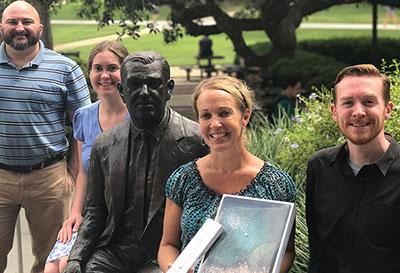Jane Dwyer Lee: Creating an alternative social work textbook

Over the years, I’ve become increasingly dismayed by the cost of textbooks and just how much of that burden is shouldered by students. Last year, I received an email from FSU Libraries recruiting faculty to participate in a grant opportunity for something called “alternative textbooks.” With the encouragement and support of FSU College of Social Work Dean for Academic Affairs Dr. Craig Stanley, I decided to apply. All I knew was that the purpose was to create more affordable alternatives to standard textbooks.
I received word from FSU Libraries that I was being awarded one of these grants, and that I would begin with an initial consultation with a library team that I would be working with over the summer of 2017. My library team consisted of Devin Soper, Jeff Phillips, Lindsey Wharton, and Julia Cater along with doctoral student Angela Lieber who is mentoring with me for my online class. From the outset, they were warm, welcoming, and filled with innovative ideas. I also attended two workshops with the library specialists “Introduction to Open Textbooks and Education Resources” and “Introduction to Using Library Licenses, Materials, and Educational Resources.”
Since I had just returned from a National Institute of Alcohol Abuse and Alcoholism training in at the University of Boston School of Social Work in the spring and was considering implementing new material for my Chemical Dependency class (now renamed Substance Use and Misuse), I decided to select this class for the alternative textbook. This class seemed the perfect fit because the field of substance use disorders is so fluid and dynamic, making an alternative textbook the ideal teaching tool. The team was also on board with my choice.
For the remainder of the summer, the team met with me bi-weekly to provide ongoing assistance developing and implementing our plan. They advised me on copyright and licensing compliance, assisted me in material selection, and consulted with me on instructional design. Our discussions touched on how college students are changing with the times and technology and as instructors, we needed to realize the paradigm shift that is changing the emphasis in the process of knowledge acquisition from the focus on memorization towards the processing and synthesizing information. Through new materials like the alternative text book, we can encourage this style of learning.
The results of my collaboration with the library team is an alternative text book consisting of a compilation of Open Education Resources (OERs) and materials licensed by the library. The most exciting thing about these kinds of resources is their ability to be reused, revised, remixed, redistributed and retained so that the materials are more up-to-date and dynamic. Educators can adapt high-quality instructional materials to fit course requirements while providing students with the most current, relevant information, and best of all, providing it free of charge!
The alternative text book grant award also provided me with the ability to funding travel, software or technology expenses and I went with an iPad Pro, allowing me to embrace the mobility and fluidity of the alternative textbook. Moving forward, I will continue to work with the library team to locate relevant resources in usable formats and platforms, as well as to monitor and assess the usability of OERs. I encourage colleagues and anyone interested to tap into this brilliant, talented, fun and eager-to-assist library team. I look forward to continuing to work with them in the future on this course and future course materials.
To learn more about the alternative textbook grant, visit: https://www.lib.fsu.edu/alttextbooks.

